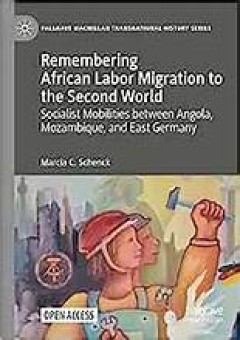Filter by

Martin Waldseemüller’s 'Carta marina' of 1516 : Study and Transcription of…
This open access book presents the first detailed study of one of the most important masterpieces of Renaissance cartography, Martin Waldseemüller’s Carta marina of 1516. By transcribing, translating into English, and detailing the sources of all of the descriptive texts on the map, as well as the sources of many of the images, the book makes the map available to scholars in a wholly unprece…
- Edition
- 1
- ISBN/ISSN
- 9783030227036
- Collation
- VII, 150 hlm,: ill, lamp;
- Series Title
- -
- Call Number
- -

Japan’s Arduous Rejuvenation as a Global Power = Democratic Resilience and …
This open access book assesses the profound impact of Japan’s aspirations to become a great power on Japanese security, democracy and foreign relations. Rather than viewing the process of normalization and rejuvenation as two decades of remilitarization in face of rapidly changing strategic environment and domestic political circumstances, this volume contextualizes Japan’s contemporary in…
- Edition
- 1
- ISBN/ISSN
- 9789811361906
- Collation
- XIII, 242 ill; lamp
- Series Title
- -
- Call Number
- -

Modern Japan’s Place in World History
This Open Access book includes chapters on the key turning points in modern Japanese history from the Meiji Restoration to Japan-China diplomatic normalization in the 1970s and beyond. The topics covered include the First Sino-Japanese War, the Russo-Japanese War, the First and Second World Wars, the Manchurian Crisis, the US Occupation, postwar Japan-China relations, and postwar decolonization…
- Edition
- 1
- ISBN/ISSN
- 978-981-19-9592-7
- Collation
- XVIII, 211
- Series Title
- -
- Call Number
- -

E-Cigarettes and the Comparative Politics of Harm Reduction
This open access book offers the first in-depth study of the history and current debates surrounding electronic cigarettes comparing the UK, US and Australia. Since their introduction, e-cigarettes have been the subject of much public, media and regulatory attention, with discussion centring on whether these devices encourage or discourage smoking. This study delves into the history of policyma…
- Edition
- 1
- ISBN/ISSN
- 978-3-031-23658-7
- Collation
- XIV, 144
- Series Title
- -
- Call Number
- -

Remembering African Labor Migration to the Second World
This open access book is about Mozambicans and Angolans who migrated in state-sponsored schemes to East Germany in the late 1970s and throughout the 1980s. They went to work and to be trained as a vanguard labor force for the intended African industrial revolutions. While they were there, they contributed their labor power to the East German economy.
- Edition
- 1
- ISBN/ISSN
- 978-3-031-06776-1
- Collation
- -
- Series Title
- Palgrave Macmillan Transnational History Series
- Call Number
- XXVII, 377

Remembering African Labor Migration to the Second World
This open access book is about Mozambicans and Angolans who migrated in state-sponsored schemes to East Germany in the late 1970s and throughout the 1980s. They went to work and to be trained as a vanguard labor force for the intended African industrial revolutions. While they were there, they contributed their labor power to the East German economy.
- Edition
- 1
- ISBN/ISSN
- 978-3-031-06776-1
- Collation
- -
- Series Title
- Palgrave Macmillan Transnational History Series
- Call Number
- XXVII, 377
 Computer Science, Information & General Works
Computer Science, Information & General Works  Philosophy & Psychology
Philosophy & Psychology  Religion
Religion  Social Sciences
Social Sciences  Language
Language  Pure Science
Pure Science  Applied Sciences
Applied Sciences  Art & Recreation
Art & Recreation  Literature
Literature  History & Geography
History & Geography